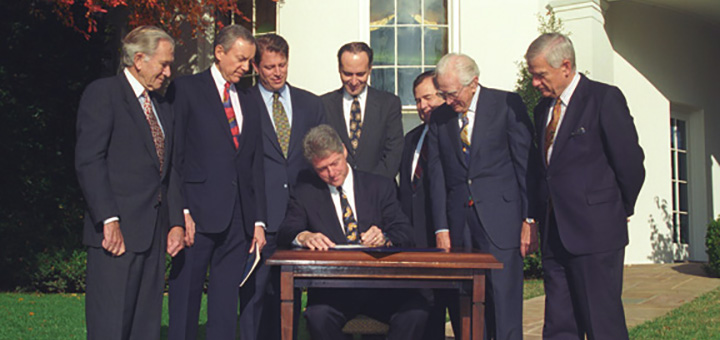The basic premise of religious freedom is simple: Government should not support, define as true, or oppose any religious belief. Although simple in theory, the application is complicated. While freedom to some may be only a matter of worship or private conviction, for others it impacts their lives in substantial ways.
This has recently been brought to the public eye in two significant arenas. First, should a business owner be allowed to refuse to provide goods or services because the sexual orientation of a customer is contrary to the business owner’s religious belief, when the owner is not required to engage in any overt activity opposing his beliefs?
The second recent claim of violation of religious freedom concerns the owners of Hobby Lobby stores in regard to the Affordable Care Act passed by Congress that requires employers to provide health insurance coverage for any FDA approved method of contraception. In the 2014 Burwell v. Hobby Lobby Stores case, stockholders stated that covering the cost of contraception methods that “end human life after conception” made them compliant in the use of those methods by their employees, thus violating their religious beliefs.
The stockholders based their legal claim on the provisions of the Religious Freedom Restoration Act, which the Seventh-day Adventist Church supported as did many religious organizations. The RFRA does not mandate that all religious beliefs be accommodated, but that the government must find the method of achieving the purpose of the legislation that has the least impact on the religious beliefs of those affected by it.
In the Hobby Lobby ruling the U.S. Supreme Court decided, by a narrow majority, that a for-profit company could have religious beliefs that should be protected. That seems simple enough. However, what makes this case so significant is that it is a reversal of previous decisions.
Extending religious exemptions
Courts have long provided special solicitude to the rights of religious organizations to craft healthcare coverage so that their doctrines are never in question. Yet, historically, the courts have distinguished religious organizations from for-profit organizations because religious groups foster the interests of people of like beliefs. Workers in for-profit corporations are not commonly drawn from one religious community. Until the Hobby Lobby decision, religious exemptions had never been extended to any entity operating in the commercial world.
It is important to note that in a previous case (United States v. Lee) the U.S. Supreme Court held that an Amish sole proprietor who had a religious belief that prohibited him from paying Social Security for his employees could not use his belief as a basis for not making the payments. The court observed that to allow a religious-based exemption to a commercial employer would operate to impose the employer’s religious faith on employees. The majority opinion in Hobby Lobby distinguished the Lee case by saying it was a tax case, which was not controlling in the Hobby Lobby case.
A dangerous approach
Now, the troublesome issue may not directly be the decision in the Hobby Lobby case, but rather what appears to be the approach of the court. My concern is that the court in these two decisions took into consideration that the belief of the Amish employer is not only held by a very small minority, but the religious organization to which he belongs is very small, while the belief of the Hobby Lobby stockholders is more widely accepted and supported by the belief system of the largest church organization in the world. Could the court have been motivated by the relative popularity of the belief and the size of the supporting organization?
If the courts made that a part of their consideration, they are moving in a dangerous direction. The Lee case and the Hobby Lobby case should both have been decided under the same rules and legal principles. To do otherwise is taking that dangerous path of preferring one religion over another—of judging the merits of a belief by how socially supported it is. That is a deathblow that destroys the very core of religious freedom.
Where will the Hobby Lobby decision lead? Since it is impossible to predict I will not speculate. I only recommend that we be aware of what is happening in the courts as they deal with the complex issues of religious freedom.
Right to refuse?
Let’s go back to the right to refuse services or goods because of the beliefs or actions of the customer. I would suggest that in the parable of the good Samaritan Jesus was teaching us that religious differences should not be a basis for withholding service to each other. The beliefs of the injured man were in direct opposition to the Samaritan’s, yet the injured man was a neighbor within the circle of those for whom the Samaritan should care.
Until a requested service is in itself a violation of conscience, I would propose that the principle of love taught by Jesus requires us to provide for the neighbor. Protecting our own freedom to live and believe as we choose compels us, as Seventh-day Adventist Christians, to think seriously before refusing to provide goods and services to anyone.
This article is the cover story for the June 2015 print edition of OUTLOOK. It was written by Darrel Huenergardt, Religious Liberty director for the Mid-America Union.
[hr]
Summary of Cases mentioned in this article:
2010 Affordable Care Act
Summary: Employers must provide healthcare for their employees that covers all forms of contraception
2014 Burwell v. Hobby Lobby Stores
Ruling: Religious beliefs of for-profit companies should be protected.
1993 Religious Freedom Restoration Act
Summary: Government shall not substantially burden a person’s exercise of religion even if the burden results from a rule of general applicability.
1981 United States v. Lee
Ruling: When followers of a particular sect enter into commercial activity as a matter of choice, the limits they accept on their own conduct as a matter of conscience and faith are not superimposed on statutory schemes which are binding on others in that activity.








